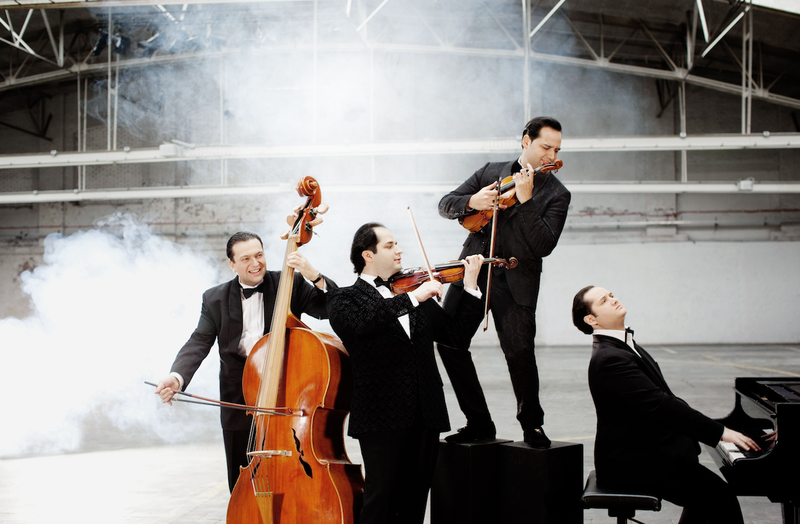The Janoska Ensemble seeks to get classical music to lighten up.
They loosen the bonds by extensively crossing genres to include jazz, Latin and other popular styles. And they strive to demonstrate what they call "Janoska Style," restoring the lost art of improvisation to otherwise over-structured classics.
The Vienna-based ensemble -- three Slovakian brothers, Ondrej and Roman Janoska, violins, and Frantisek Janoska, piano; and their German brother-in-law, Julius Darvas, on double bass -- are on a 10-city tour of the United States that covers not so much the great American musical capitals but includes visits to towns in Texas, New York, Virginia, Tennessee, Indiana and Wisconsin, as well as two stops in Arkansas:
• A concert at 8:15 p.m. Wednesday in the Administration Auditorium at Harding University, 940 E. Park Ave., Searcy, part of the university's Concert Series. Tickets are $8 in advance, $10 at the door. Call (501) 279-4343.
• A master class on "The Art of Improvisation," 8-9:30 a.m. Friday at the University of Arkansas, Fayetteville. (An 8 p.m. Friday concert at Fayetteville's Walton Arts Center has been canceled.)

The tour -- and the program for Wednesday's concert -- is also in conjunction with the April 15 release of the quartet's latest Deutsche Grammophon recording, Revolution, aptly titled because they not only break all sorts of musical rules but because three of the 11 cuts are, or are based on, Beatles songs -- "Yesterday," "Penny Lane" and "Let It Be."
"We are all Beatles fans in the ensemble," Darvas says by phone from Vienna, noting that the Fab Four created not just a song by that title but an entire musical revolution in pop and rock. "The Beatles make very simple but ingenious music and they have wonderful words, and also the melodies are also very beautiful.
"We have recorded [the three John Lennon-Paul McCartney songs], of course in our own style, the 'Janoska Style.' This is our view of classical music today, and we had some great arrangements and ideas." For example, Darvas explains, seeing a sort of Baroque vibe to "Yesterday," "we took this very very carefully and included the Bach Cello Suite No. 1 [in G major] into the melody."
For "Penny Lane," according to a news release, "the ensemble stays true to bright tone of the unusual-for-a-pop-song B major key, but move it "bit by bit from an easy syncopated swing into a dramatic tango rhythm."
Darvas says they didn't include the song "Eleanor Rigby," famous for its cello solo, on the CD. "It was originally composed for [string] quartet," he explains.

"It was a great number, but it touches us not so much. We decide to make songs which are written for pop instruments, so it's a totally different sound with our acoustic instruments."
The album also contains arrangements of works by Wolfgang Amadeus Mozart, Peter Ilich Tchaikovsky, Fritz Kreisler and Henrik Wieniawski; a couple of original pieces -- "Leo's Dance" by Frantisek Janoska and "Hello, Prince!" by Roman Janoska; and at least one other demonstration of "Janoska Style" -- "Air," which develops a theme by Johann Sebastian Bach into "a chain of improvisations that run through each instrument, interspersing blues notes, free solos and carefully nuanced jazz harmonies, yet capturing Bach's underlying essence," according to the news release.
The spirit of improvisation is also the subject of the master class they'll be teaching in Fayetteville.
"The art of improvisation was very usual in the Baroque period, also in the Classical period, but it [was] lost in classical music because it's not taught on high-school level," Darvas explains. Improvisation is common in jazz, but "our basic is the classical music. It's the opposite. We want to bring classical music a little bit jazz inside and improvisation."
The master class "will be about [how] to make classical music freer and also not to just not to play just what's in the score written. How to open new windows. How you can play from deep from the spirit."
Style on 03/24/2019

